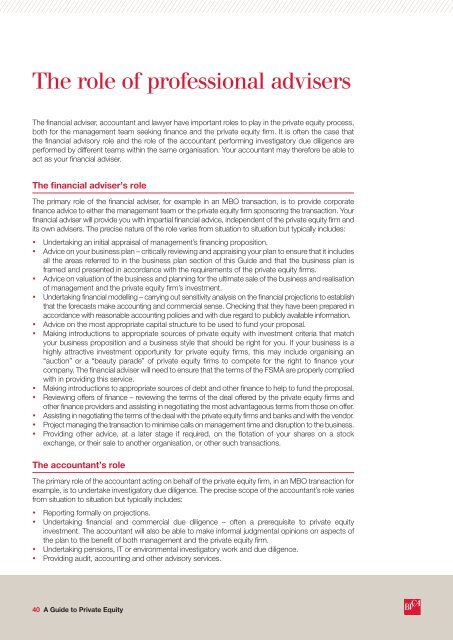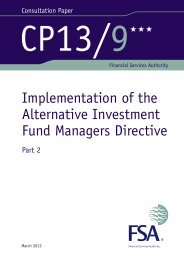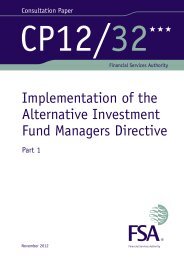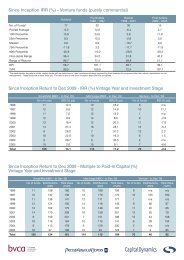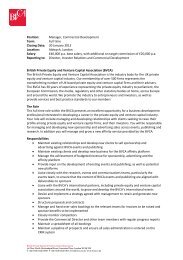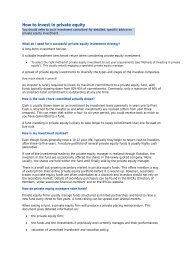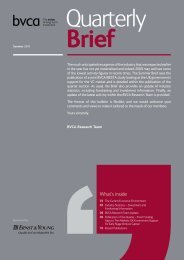A Guide to Private Equity - BVCA admin
A Guide to Private Equity - BVCA admin
A Guide to Private Equity - BVCA admin
You also want an ePaper? Increase the reach of your titles
YUMPU automatically turns print PDFs into web optimized ePapers that Google loves.
The role of professional advisers<br />
The financial adviser, accountant and lawyer have important roles <strong>to</strong> play in the private equity process,<br />
both for the management team seeking finance and the private equity firm. It is often the case that<br />
the financial advisory role and the role of the accountant performing investiga<strong>to</strong>ry due diligence are<br />
performed by different teams within the same organisation. Your accountant may therefore be able <strong>to</strong><br />
act as your financial adviser.<br />
The financial adviser’s role<br />
The primary role of the financial adviser, for example in an MBO transaction, is <strong>to</strong> provide corporate<br />
finance advice <strong>to</strong> either the management team or the private equity firm sponsoring the transaction. Your<br />
financial adviser will provide you with impartial financial advice, independent of the private equity firm and<br />
its own advisers. The precise nature of the role varies from situation <strong>to</strong> situation but typically includes:<br />
• Undertaking an initial appraisal of management’s financing proposition.<br />
• Advice on your business plan – critically reviewing and appraising your plan <strong>to</strong> ensure that it includes<br />
all the areas referred <strong>to</strong> in the business plan section of this <strong>Guide</strong> and that the business plan is<br />
framed and presented in accordance with the requirements of the private equity firms.<br />
• Advice on valuation of the business and planning for the ultimate sale of the business and realisation<br />
of management and the private equity firm’s investment.<br />
• Undertaking financial modelling – carrying out sensitivity analysis on the financial projections <strong>to</strong> establish<br />
that the forecasts make accounting and commercial sense. Checking that they have been prepared in<br />
accordance with reasonable accounting policies and with due regard <strong>to</strong> publicly available information.<br />
• Advice on the most appropriate capital structure <strong>to</strong> be used <strong>to</strong> fund your proposal.<br />
• Making introductions <strong>to</strong> appropriate sources of private equity with investment criteria that match<br />
your business proposition and a business style that should be right for you. If your business is a<br />
highly attractive investment opportunity for private equity firms, this may include organising an<br />
“auction” or a “beauty parade” of private equity firms <strong>to</strong> compete for the right <strong>to</strong> finance your<br />
company. The financial adviser will need <strong>to</strong> ensure that the terms of the FSMA are properly complied<br />
with in providing this service.<br />
• Making introductions <strong>to</strong> appropriate sources of debt and other finance <strong>to</strong> help <strong>to</strong> fund the proposal.<br />
• Reviewing offers of finance – reviewing the terms of the deal offered by the private equity firms and<br />
other finance providers and assisting in negotiating the most advantageous terms from those on offer.<br />
• Assisting in negotiating the terms of the deal with the private equity firms and banks and with the vendor.<br />
• Project managing the transaction <strong>to</strong> minimise calls on management time and disruption <strong>to</strong> the business.<br />
• Providing other advice, at a later stage if required, on the flotation of your shares on a s<strong>to</strong>ck<br />
exchange, or their sale <strong>to</strong> another organisation, or other such transactions.<br />
The accountant’s role<br />
The primary role of the accountant acting on behalf of the private equity firm, in an MBO transaction for<br />
example, is <strong>to</strong> undertake investiga<strong>to</strong>ry due diligence. The precise scope of the accountant’s role varies<br />
from situation <strong>to</strong> situation but typically includes:<br />
• Reporting formally on projections.<br />
• Undertaking financial and commercial due diligence – often a prerequisite <strong>to</strong> private equity<br />
investment. The accountant will also be able <strong>to</strong> make informal judgmental opinions on aspects of<br />
the plan <strong>to</strong> the benefit of both management and the private equity firm.<br />
• Undertaking pensions, IT or environmental investiga<strong>to</strong>ry work and due diligence.<br />
• Providing audit, accounting and other advisory services.<br />
40 A <strong>Guide</strong> <strong>to</strong> <strong>Private</strong> <strong>Equity</strong>


